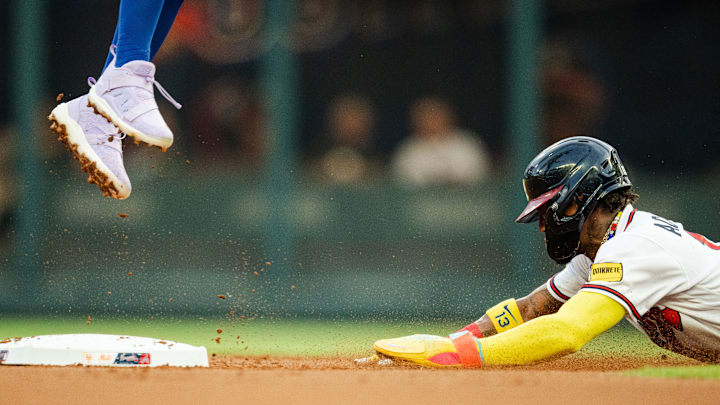Ronald Acuña Jr. is on the cusp of becoming the first player in MLB history to hit 30 homers and steal 60 bases in a single season... with a month to go in the season. There's a high probably he steals 70 bases, which hasn't been done by a Brave since 1991, and there's even a long shot of a 40/70 season, something that makes Eric Cole shutter to hear.
However, if you were to look at any baserunning metric, you'd see that Ronnie ranges from being above average to simply being average. For most Braves fans, this would seem shocking. After all, not only is he stealing bases at an 85% clip, but he's also still doing things like scoring on a sacrifice fly to 2B.
So what's going on?
Why do baserunnning metrics hate Ronald Acuña Jr?
They don't, but they are lower on Acuña than even I would expect. After all, Ronnie leads all of baseball in steals, and he's doing it at a success rate that's 5% above the league average. That would generally indicate a really great baserunner.
But Acuña is currently ninth in baseball in Fangraphs' BsR with a 5.4 BsR, exactly half of the MLB leader Corbin Carroll, and is 119th in Baseball Savant's Baserunning.
Baseball Savant and Fangraphs have different formulas to calculate baserunning ability. Baseball Savant does not include base-stealing while Fangraphs' does, but FanGraphs doesn't have public access to the weight of an individual baserunning decision, which Savant does.
Fangraphs combine uses a score for stealing bases (wSB), taking extra bases (UBR), and avoiding double plays (wGDP) to create BsR.
Unsurprisingly, Acuña does lead the league in wSB with 6.1. However, the metrics believe that he either hasn't been aggressive or hasn't been successful (or both) at taking extra bases and only has a UBR of 0.4.
What's really hurt Acuña is the number of double plays he's grounded into. His wGDP is -1.1. This isn't abysmal, as Carlos Correa has a wGDP of -4.4, but it isn't great.
Should the ability to avoid double plays, especially when you hit a ton of hard ground balls, be factored into your base running abilities? It's debatable, but that's the way Fangraphs does it.
Baseball Savant doesn't grade stolen bases at all, which makes the potential NL MVP look a lot worse on the bases than he really is. But I also mostly agree with the ratings. After all, they are calculated by people much smarter than I am.
The scoring on the sacrifice fly that I showed you at the beginning gave him 0.25 for advancing safely. A lot of risk on a ball so shallow, but is rewarded for scoring.
Unfortunately, Ronnie's been thrown out at home twice. This is the worst one, getting -0.83 runs credited.
What's hurt Acuña the most, however, is simply not advancing at all. Most I can get on board with. This double by Ozzie Albies was hit with one out, but it was far enough that Ronnie should have been able to score. He was hit with -0.12.
He also has several -0.01 and -0.02 for not taking the extra base as a batter or a runner. Could he have turned this into a triple? Probably, but is it worth getting thrown out? Probably not.
However, there are a few incidents where I disagree with Savant.
